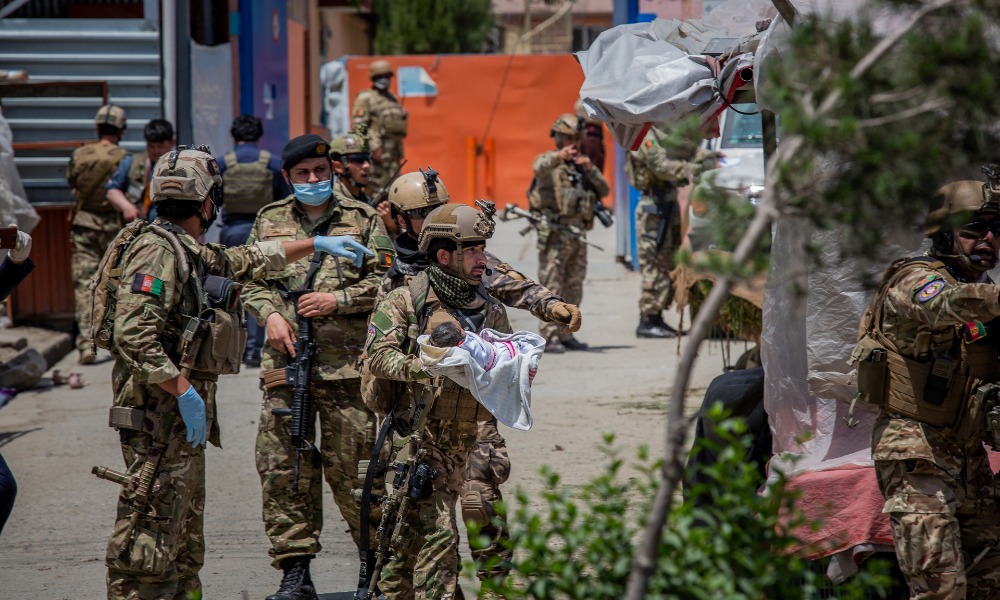Latest News
1399 a bleak year for Afghans as thousands died in the conflict

Afghans will on Saturday usher in 1400, a new year in the Persian calendar while remembering 1399 as having devastated thousands of families who lost loved ones to the war.
Celebrated by an estimated 300 million people around the world, Nawruz will be bittersweet for Afghans following yet another year scarred by attacks.
Hundreds of attacks against civilians and Afghan security forces were recorded in 1399 and a political settlement to the 20-year-old conflict has so far been elusive.
According to an Ariana News tally, at least 923 targeted assassinations took place in the last 365 days, including 11 journalists/media workers, 17 civil society activists, four provincial council members, and hundreds of government employees and security force members.
In addition, Ariana News’ tally found at least 649 people were wounded in targeted attacks.
Major attacks also rocked the country and devastated families in 1399.
Just six days into 1399, a Gurdwara, or temple used by Sikhs and Hindus, was attacked by Daesh militants, leaving 25 Sikhs dead and eight more wounded.
In June, Daesh militants struck again. This time attacking a maternity ward at Dasht-e-Barchi hospital. At least 24 people including women, newborn babies, and nurses were killed and 16 more were wounded in the attack.
Just an hour later, an explosion targeted a funeral ceremony in eastern Nangarhar province in which 24 people were killed and 68 others were wounded.
In October another major attack was carried out – also in Dasht-e-Barchi. But this time targeting students at an educational center. At least 24 people including a security guard and students were killed and 57 wounded. Daesh claimed responsibility for the attack.
Just days later, on November 2, Daesh militants attacked Afghanistan’s largest educational institution – Kabul University. At least 22 people were killed and 52 others injured in the attack.
In addition to these major complex attacks, insurgents also stepped up targeted attacks and assassinations against individuals or small groups of specific people – either by shooting them or placing magnetic IEDs against vehicles their targets were traveling in.
Even Afghanistan’s First Vice President Amrullah Saleh was targeted in a magnetic IED explosion. Saleh did however survive but sustained minor injuries.
Military operations
Meanwhile, the Ministry of Defense says that Afghan forces have carried out more than 20,000 operations against the Taliban and other militant groups during this solar year.
In this time, the Taliban also attempted to take control of eight provinces and 132 districts, the Afghan Army said. According to the military, eight districts were retaken from the Taliban during the operations.
However, clashes between government forces and militant groups took a heavy toll on civilians.
According to the UN and Afghanistan Human Rights Commission’s tallies, at least 2,958 civilians were killed and 5,542 more wounded in clashes and bomb blasts during the last 365 days.
The reports stated on average eight people have been killed and 15 others wounded on a daily basis this solar year.
The UN blamed the Taliban for 53 percent, the government, and foreign forces for 15 percent, Daesh for five percent, and unknown armed men for 25 percent of civilian casualties.
On the other hand, the foreign troops stationed in Afghanistan did not suffer any casualties following the signing of a peace deal between the US and the Taliban in February last year.
The Afghan forces, however, suffered extremely heavy casualties in the past solar year with more than 12,000 Afghan soldiers reportedly having been killed.
The Afghan military claimed that 18,288 Taliban insurgents were in turn killed during clashes in the past 365 days.
Latest News
Japan allocates nearly $20 million in humanitarian aid for Afghanistan

The Embassy of Japan in Afghanistan announced on Friday that the country has allocated $19.5 million in humanitarian assistance to Afghanistan.
In a statement, the Japanese Embassy said it hopes the aid will help bring positive change to the lives of vulnerable Afghans.
According to the statement, the assistance will cover the basic humanitarian needs of vulnerable communities in Afghanistan.
The embassy added that the aid will be delivered through United Nations agencies, international organizations, and Japanese non-governmental organizations operating in Afghanistan.
Japan’s total assistance to Afghanistan since August 2021 has reached more than $549 million.
Latest News
Afghan border forces prevent illegal entry of hundreds into Iran

Security forces at the Islam Qala border in Herat province prevented hundreds of young Afghans from illegally entering Iran.
Officials from the 207 Al-Farooq Army Corps said that around 530 people attempted over the past two days to illegally enter Iranian territory through areas of Kohsan district in Herat, but border forces detained them and transferred them back to their original areas.
Meanwhile, officials in the local administration of Herat said that due to severe cold along the illegal migration route to Iran, three Afghan migrants have lost their lives in the Kohsan district of the province, and a shepherd has also died there for the same reason.
Mohammad Yousuf Saeedi, spokesperson for the Herat governor’s office, said that some statistics and images shared on social media regarding the incident are not reliable.
According to him, further investigations are underway to determine whether any individuals have died on the other side of the border.
Latest News
US pauses green card lottery program after Brown University shooting

President Donald Trump suspended the green card lottery program on Thursday that allowed the suspect in the Brown University and MIT shootings to come to the United States.
Homeland Security Secretary Kristi Noem said in a post on the social platform X that, at Trump’s direction, she is ordering the United States Citizenship and Immigration Services to pause the program, the Associated Press reported.
“This heinous individual should never have been allowed in our country,” she said of the suspect, Portuguese national Claudio Neves Valente.
Neves Valente, 48, is suspected in the shootings at Brown University that killed two students and wounded nine others, and the killing of an MIT professor. He was found dead Thursday evening from a self-inflicted gunshot wound, officials said.
Neves Valente had studied at Brown on a student visa beginning in 2000, according to an affidavit from a Providence police detective. In 2017, he was issued a diversity immigrant visa and months later obtained legal permanent residence status, according to the affidavit. It was not immediately clear where he was between taking a leave of absence from the school in 2001 and getting the visa in 2017.
The diversity visa program makes up to 50,000 green cards available each year by lottery to people from countries that are little represented in the U.S., many of them in Africa. The lottery was created by Congress, and the move is almost certain to invite legal challenges.
Nearly 20 million people applied for the 2025 visa lottery, with more than 131,000 selected when including spouses with the winners. After winning, they must undergo vetting to win admission to the United States. Portuguese citizens won only 38 slots.
Lottery winners are invited to apply for a green card. They are interviewed at consulates and subject to the same requirements and vetting as other green-card applicants.
Trump has long opposed the diversity visa lottery. Noem’s announcement is the latest example of using tragedy to advance immigration policy goals. After an Afghan man was identified as the gunman in a fatal attack on National Guard members in November, Trump’s administration imposed sweeping rules against immigration from Afghanistan and other counties.
While pursuing mass deportation, Trump has sought to limit or eliminate avenues to legal immigration. He has not been deterred if they are enshrined in law, like the diversity visa lottery, or the Constitution, as with a right to citizenship for anyone born on U.S. soil. The Supreme Court recently agreed to hear his challenge to birthright citizenship.
-

 Latest News5 days ago
Latest News5 days agoGermany speeds up admission of Afghans from Pakistan
-

 Sport5 days ago
Sport5 days agoIPL 2026 Auction set for Abu Dhabi with $28.6 million purse at stake
-

 Latest News5 days ago
Latest News5 days agoAfghanistan to establish independent oil and gas authority
-

 Latest News5 days ago
Latest News5 days agoUS intelligence chief warns of ‘direct threat’ from suspected terrorists inside the country
-

 Latest News4 days ago
Latest News4 days agoIEA supreme leader stresses enforcement of Sharia law and sincere public service
-

 International Sports5 days ago
International Sports5 days agoILT20: Desert Vipers qualify for playoffs with five-wicket win over Dubai Capitals
-

 World5 days ago
World5 days agoFather and son behind Bondi Jewish festival shooting that killed 15, Australian police say
-

 International Sports5 days ago
International Sports5 days agoATN secures broadcast rights for four major AFC sporting events
























